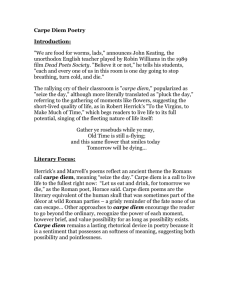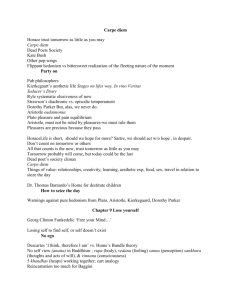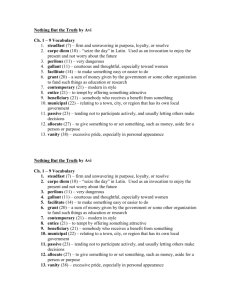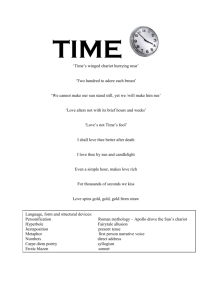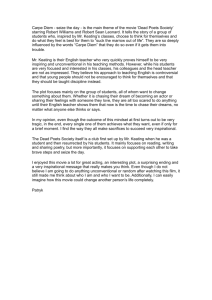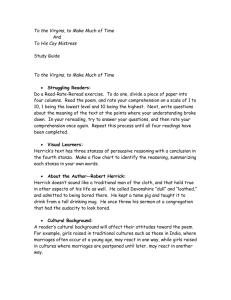Changes in and Goals of USAID M&E Reporting Requirements
advertisement
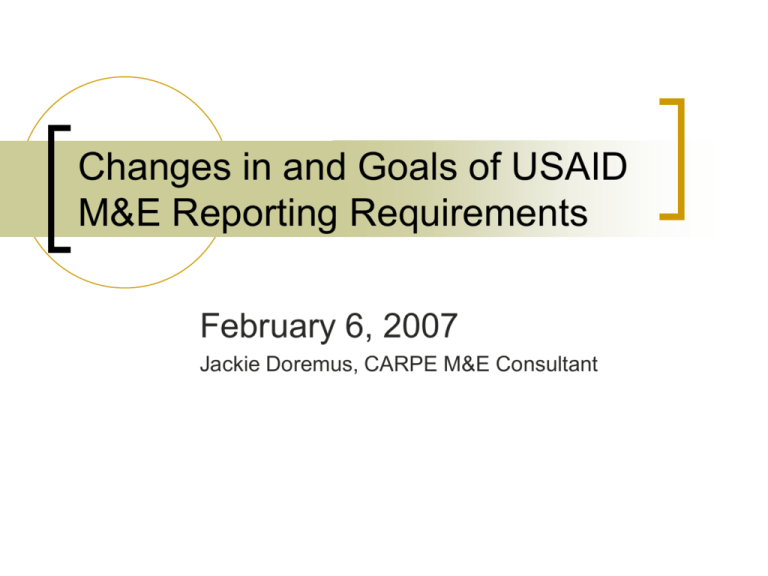
Changes in and Goals of USAID M&E Reporting Requirements February 6, 2007 Jackie Doremus, CARPE M&E Consultant Outline of Presentation Success of M&E to date – Broadly and the Operational Plan case study Overall goals of CARPE M&E – why do we want this information? Brief overview of current M&E system Proposed CARPE M&E Calendar Feedback from Partners’ Phase IIA final reports Outline of Presentation Proposed updates to CARPE M&E system SO level indicator Updated matrix MOVs Narrative structure for LS consortia GIS data Feedback and distribution of tools Success of CARPE M&E System: Broadly M&E system developed to satisfy all CARPE USAID reporting requirements, finalized Feb 2005 Effectively communicated results to Congress, helping ensure a fourth year of funding Success of CARPE M&E System: A case study December 2006 saw major changes in USAID’s reporting structure New, comprehensive reporting tool, the Operational Plan, required for each Operating Unit Entered into a web-based system, FACTS: Foreign Assistance Coordination and Tracking System Data requirements much greater than previous USAID reports Very little ‘warning’ or collaboration with the field on the content of the report Success of CARPE M&E System: A case study CARPE team was only SO in USAID/DRC to not return to partners for repeated information requests to satisfy FACTS* Operational Plan design mimicked CARPE database design Information entered into FACTS was auditable and robust due to MOVs and matrices FACTS stats from Matrix FACTS required activity budgeting Average % of the total LS budget spent on “Training/Capacity Building” is 14% CARPE funds led to at least 2,163 people receiving training with FY06 funds FY06 LS funds were used to improve management on 32.6 M ha Goals of CARPE M&E FUNDING Regular conduit of communication between partners and CTO Determine project warrants funding Use all available resources to communicate results and ensure funding Better to have structured and well-anticipated report submission than ad hoc requests and changing requirements Must efficiently use time and resources of partners during reporting submission and of CARPE team during processing of reports Matrix requires an initial investment from partners to learn format, then an annual large investment when consortia create the workplan Landscape leaders will need to help new subpartners Goals of CARPE M&E USG Grant Management Conservation Knowledge CARPE M&E Communication with Stakeholders PerformanceBased Agreements Overview of CARPE M&E Semi-Annual Reporting Cycle: 1. A workplan matrix and narrative 2. A Semi-Annual Report matrix and narrative 3. An Annual Report matrix and narrative MOVs A one-time GIS data submission Overview of CARPE M&E Review Criteria 1. Partners submit a workplan matrix and proposed budget Analyzed by CARPE using rubric (ex ) FY06 Workplans were submitted in CARPE IIB RFA proposals Approval Substantive Content of Work Plan Distribution of tasks is appropriate given the current stage of the LUP process Yes Distribution of tasks between macro zones is balanced (50+% outside PA’s) Yes Tasks are included that constitute a reason- able stakeholder engagement strategy Yes Tasks include people-centered alternative livelihoods options to conservation threats Yes Data collection is appropriate to support current stage of the LUP process Yes Training contributes to sustainable local institutional conservation capacity Yes Coherence of Work Plan Tasks are coherently linked to PMP. Yes Work plan tasks are adequate for achieving specific BM’s. Yes Activity categories are appropriate. Yes Task responsibilities are clearly defined. Yes Tasks are reasonable to achieve in given timeframe. Yes Nature of tasks is clearly defined Yes Task quarterly progress schedule (in %) is identified and reasonable Yes Performance Monitoring IR’s and macro zones are appropriately identified Yes BM’s are consistent with the PMP Yes MOV’s are acceptable, verifiable and document achievement of the BM’s Yes Budget Budget is segmented by macro zone, activity cat., USAID-cost share, partner Yes Overview of CARPE M&E Workplan data is entered into a MS Access database The database links Landscape financial and performance data Financial: Activity budgeting by zone type, partner, and country, semi-annual expenditure rate Performance: Each zone’s name, benchmark, size, country location, and type Allows CARPE rough comparisons between landscapes and a way to quickly scale up the regional program Eventually data will be represented spatially using zone and landscape polygons Overview of CARPE M&E Planned ha under improved management by zone type Millions 15 10 hectares 5 PA CBNRM ERZ 0 FY06 FY07 fiscal year of funding FY08 Overview of CARPE M&E 2. Partners submit Semi-Annual Report (SAR) matrix and narrative SAR is a tool for partners to communicate to the CARPE Operating Unit on progress toward benchmarks and any proposed changes Level of Effort: Adaptive management—flexible Required in Cooperative Agreements No major changes made to matrix submitted as workplan unless changes in benchmarks Percentage accomplished on right-side is updated CARPE uses SAR performance (financial and programmatic) to influence budgeting of LS funds Overview of CARPE M&E 3. Partners submit an Annual Report matrix, narrative, and MOVs Matrices: Final results are updated into database for reporting to Washington FACTS, Global Climate Change, 118/119, Performance Report, etc Narratives: Success stories and reporting is created from accomplishments listed here MOVs: catalogued, cross-checked, and evaluated Important as a check to show that results were achieved Required by USAID data quality assessment Esp important due to limitation of field visits Some published on CARPE website Proposed CARPE Reporting Calendar FY07 Workplan and FY06 SAR submitted August 1, 2007 CARPE analysis, workplan approval, and final budget September 1, 2007 Try to continue approximately this cycle for length of agreements to help planning, though flexibility is necessary FY06 Final Report and MOVs submitted Dec 1, 2007 Site visits Feb-Aug 2008 CARPE analyzes data for submission to Washington Dec-Jan Updating of M&E System All proposed updates are small and have been balanced with need for stability in reporting Changes will: Better measure CARPE results as the program matures Ensure CARPE receives complete information from bundled consortia Segments reporting was automatically disaggregated by country Respond to Partners’ feedback in Final Reports Improve data quality Help CARPE reporting burden with reduction in team size Summary of Partners’ Feedback Thank you! Feedback was very helpful Across the board notes: Most partners find the matrix an important and useful tool Some have incorporated it into their own LS monitoring plans Useful for team building and will be important for guiding new consortia and managing sub-grants Smaller segments and segments with many donors found it burdensome Request for French translation of reporting tools Request limitation in future changes to format – has stabilized since Feb 2005 workshop Matrix is resource and time intensive Request CARPE distribute a clear reporting calendar to help partners’ plan meeting logistics and time management Matrix available in French, guidance currently is not Recommendation for more site visits by CTO Proposed Updates to M&E System: SO level indicator SO Level indicator from PMP: “Population status for selected biodiversity “indicator” species such as: wide-ranging “landscape” species and/or ecological keystone species (e.g. elephants, large predators) and/or globally threatened species (such as, mountain gorillas, bonobos, etc.)” Program maturity Unit of measurement described in PMP: No. of individuals of indicator species Timing: Biennial/triennial Compatible with SOFR Indicators Will be separated and not linked to tasks Updated Matrix People trained summarized on separate page Reported by “training event” On-going tasks link to MOVs and LUP progress should be described as best as possible Percentages now given semi-annually on workplanning (right) side Changes from Workplan or SAR marked in RED font and explained in narrative Disaggregated by gender No. of days trained no “comparison percentages” (since changes highlighted in red) Zone names Add zone ID (assigned by CARPE, see future handout) Add country where zone is found in parentheses, below name Updated Matrix Break down budgets by country whenever possible, even within the same NGO Example: WWF in TNS Cameroon and CAR Linked to Transformational Diplomacy reporting requirements Annual Reports and Workplans will be posted on the CARPE website (without financial data) Feedback form Updates: Means of Verification (MOVs) Hyperlinking has helped control the MOVs, however some were missing or mis-linked for FY05 If MOVs are missing without explanation, CARPE will report the benchmark as not achieved in Washington reporting MOVs are sifted through by CARPE team and appropriate material will be published on the CARPE website Narrative Updates Narrative format will continue in the same format as before, with increased page limits to accommodate LS consortia Suggestions welcome in feedback form Annual Report will include “success stories” with photos, like the Final Reports of Phase IIA GIS Data CARPE partners are active in LUP in more than 150 zones Shapefile data received for Phase IIA zones Quality was uneven, few partners sent in metadata, required great time and resources from UMD/NASA team to clean data Destination for shapefiles CARPE website CARPE management tool GIS next steps Landscapes will give CARPE the names and contact information for their GIS experts so that they can be contacted directly The polygons for the remaining zones for Phase IIB will be sent in to CARPE by a date agreed at this workshop Suggestion: one month from now? Feedback and distribution of tools A form has been created and feedback on all of these issues is welcome and appreciated Feedback will be compiled and a consensus distributed by end of workshop. Most importantly: Reporting Calendar GIS point of contact and polygon due date Feedback and distribution of tools The updated tools (Workplan, SAR, and AR matrices and narratives), zone ids, summary of changes, and this presentation will be available on the CARPE website and can be transferred electronically by flashdisk at this workshop after feedback is compiled and incorporated The summary of the decisions made here on CARPE M&E will also be distributed in paper after the feedback has been compiled

